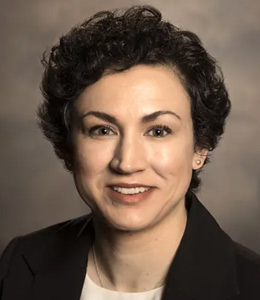
Professor Dame Sue Hill, DBE, FMedSci, FRSB, FRCP(Hon), FRCPath(Hon)
Chief Scientific Officer and SRO for Genomics, NHS England
Professor Dame Sue Hill, DBE, FMedSci, FRSB, FRCP(Hon), FRCPath(Hon)
Chief Scientific Officer and SRO for Genomics, NHS England

Professor Dame Sue Hill Professor Sue Hill DBE PhD DSc CBiol FRSB Hon FRCP Hon FRCPath is the Chief Scientific Officer for England and the head of profession for the healthcare science workforce in the NHS and associated bodies, providing professional leadership and expert clinical advice across the health and care system. She is a respiratory scientist by background with an international academic and clinical research reputation.
Professor Hill has a broad portfolio of policy responsibilities and for the past decade she has led a variety of major system and workforce transformation initiatives for the Government to improve patient outcomes and service effectiveness in the NHS and beyond.
Sue is the Senior Responsible Officer for Genomics in NHS England, driving the programme to introduce a nationwide Genomic Medicine Service transforming care pathways across a wide range of clinical conditions. This builds on her work in leading the NHS contribution to the 100,000 Genomes Project. Additionally, Sue provides strategic leadership for the Health Education England Genomics Education Programme.

Richard Woychik, PhD
Director, National Institute of Environmental Health Sciences
Richard Woychik, PhD
Director, National Institute of Environmental Health Sciences, National Institutes of Health

Richard Woychik, Ph.D., became the Director of the National Institute of Environmental Health Sciences (NIEHS), one of the National Institutes of Health (NIH), and the National Toxicology Program (NTP) on June 7, 2020. In these roles, Woychik oversees federal funding for biomedical research to discover how the environment influences human health and disease. Woychik and NIEHS/NTP staff receives input from several advisory boards and councils to accomplish this significant task.
Prior to becoming Director and since 2011, Woychik served as Deputy Director of NIEHS. In this role, he assisted the former NIEHS Director, Linda Birnbaum, Ph. D, in the formulation and implementation of plans and policies necessary to carry out the NIEHS missions and the administrative management of NIEHS.
As a mammalian geneticist, Woychik has had a number of noteworthy accomplishments. His laboratory was the first to clone and characterize the gene called agouti, which provided molecular insights into obesity and the satiety response in the brain. Additionally, his laboratory was the first to identify a gene mutation associated with polycystic kidney disease, which provided insights into this molecular biology of this important human disease. Also, his laboratory was the first to determine that a member of the protocadherin family was associated with the hearing loss in a mouse model that was ultimately paved the way to better understanding the molecular basis of Usher syndrome type 1F in humans. More recently his research program has been focused on investigating the molecular mechanisms associated with how environmental agents influence the epigenetic control of gene expression.
Woychik previously served as president and CEO of Jackson Laboratory in Bar Harbor, Maine, and also functioned as the director of the laboratory’s NCI designated Cancer Center. Prior to leading The Jackson Laboratory, Woychik’s professional history also included positions in both academia and industry: chief scientific officer for Lynx Therapeutics, Hayward, CA; head of the Parke-Davis Laboratory of Molecular Genetics, Alameda, CA; professor within the Departments of Pediatrics, Genetics and Pharmacology at the Case Western Reserve University, Cleveland, Ohio; and senior research scientist at the Oak Ridge National Laboratory, Oak Ridge, Tenn.
Woychik completed his B.S. and M.S. at the University of Wisconsin, Madison, and earned his Ph.D. in molecular biology at Case Western Reserve University in 1984. He received his postdoctoral training in the Laboratory of Philip Leder at Harvard Medical School with fellowship support from the Jane Coffin Childs Memorial Fund and from the Howard Hughes Medical Institute.

Mark McClellan, MD, PhD
Director and Robert J. Margolis, M.D., Professor of Business, Medicine and Policy, Margolis Center for Health Policy, Duke University
Mark McClellan, MD, PhD
Director and Robert J. Margolis, M.D., Professor of Business, Medicine & Policy at the Margolis Center for Health Policy, Duke University

Mark McClellan, MD, PhD, is Director and Robert J. Margolis, M.D., Professor of Business, Medicine and Policy at the Margolis Center for Health Policy at Duke University. He is a physician-economist who focuses on quality and value in health care, including payment reform, real-world evidence and more effective drug and device innovation. His current work on responding to the Covid-19 public health emergency spans public health containment and testing strategies, reforming health care toward more resilient models of delivering care, and accelerating the development of therapeutics and vaccines. He is former administrator of the Centers for Medicare & Medicaid Services and former commissioner of the U.S. Food and Drug Administration, where he developed and implemented major reforms in health policy. Dr. McClellan is an independent board member on the boards of Johnson & Johnson, Cigna, Alignment Healthcare, and Seer; co-chairs the Guiding Committee for the Health Care Payment Learning and Action Network; and serves as an advisor for Blackstone Life Sciences, Arsenal Capital Partners, and MITRE.

Muin J. Khoury, MD, PhD
Director, Office of Public Health Genomics, Centers for Disease Control and Prevention
Muin J. Khoury, MD, PhD
Director, Office of Public Health Genomics, Centers for Disease Control and Prevention

Dr. Khoury is the founding director of the CDC’s Office of Genomics and Precision Public Health. The Office was formed in 1997 to assess the impact of advances in human genetics and the Human Genome Project on public health and disease prevention. In 2019, the Office was renamed to the Office of Genomics and Precision Public Health. Dr. Khoury has developed a number of successful ongoing national and international initiatives to translate advances in genomics and precision health technologies to recommendations and actions that improve health and prevent disease throughout the life stages.
Dr. Khoury received his B.S. degree in Biology/Chemistry from the American University of Beirut, Lebanon and his medical degree and Pediatrics training from the same institution. He received a Ph.D. in Human Genetics/Genetic Epidemiology and training in Medical Genetics from Johns Hopkins University. Dr. Khoury is board certified in Medical Genetics.
Dr. Khoury received the Public Health Service Special Recognition Award in 1990 for his outstanding contribution to the scientific literature in the areas of birth defects and genetic epidemiology. In 1994, he received the Arthur Fleming Award for outstanding government service. In 1998, Dr. Khoury was credentialed for the Senior Biomedical Research Service for outstanding contributions to public health. In 2000, he received the CDC Research Honor Award for outstanding national leadership in genetics and public health.
Dr. Khoury has published extensively in the fields of genetic epidemiology, public health genomics and precision public health. He has over 500 scientific publications including articles, books and book chapters. In 1993, he published a textbook entitled: “Fundamentals of Genetic Epidemiology”. In 2000, he was the lead editor for the book entitled: “Genetics and Public Health in the 21st Century: Using Genetic Information to Improve Health and Prevent Disease”. His 2004 book entitled “Human Genome Epidemiology” illustrates the applications of epidemiologic methods and approaches to the continuum of genomic information from research to practice. In 2010, he published a completely updated second edition of “Human Genome Epidemiology”.
Dr. Khoury is a member of many professional societies and serves on the editorial boards of several journals. He is a frequent keynote speaker at many academic institutions, professional organization meetings, as well as state, regional, national and international conferences. He also serves on several scientific, public health, and health policy national and international committees. He is an adjunct professor in the Departments of Epidemiology and Environmental and Occupational Health at Emory University Rollins School of Public Health and an associate in the Department of Epidemiology at Johns Hopkins University Bloomberg School of Public Health.

Rebecca Boyles, MS
Senior Scientist, Bioinformatics and Data Science at RTI International
Rebecca Boyles, MS
Senior Scientist, Bioinformatics and Data Science, RTI International 
Rebecca Boyles has 20+ years of experience in environmental health science research with a focus on data science applications, including data management technologies and data integration. She has particular expertise in designing data-driven research methods and architectures to support research collaborations. She is currently the Co-Principal Investigator of the NHLBI BioData Catalyst Coordinating Center, a Project Director on the NIH Data Commons Facilitation Center, the Co-Director of Infrastructure for the Environmental Influences on Child Health Outcomes (ECHO) Data Analysis Center, a member of the North Carolina Precision Health Collaborative Steering Committee, and co-leads the RTI Women in STEM Employee Resource Group.
While a data scientist at the National Institute of Environmental Health Sciences (NIEHS), Ms. Boyles was instrumental in advancing the strategic plan for knowledge management and data science through the establishment of a new data science program. She initiated efforts to improve access to resources and customized training that support the information needs of NIEHS staff; providing customized, information/knowledge solutions; and creating an infrastructure and culture surrounding data management, interoperability, and sharing. Additionally, she served on the project teams for the NIH Big Data 2 Knowledge Initiative that included the Data Discovery Index and the Community-Based Standards effort. Ms. Boyles is trained as a toxicologist and has previously managed large human health assessments for the US EPA and commercial clients that led to the development of software tools, still used in the field and by US EPA, designed to streamline scientific data extraction, large modeling applications, and risk assessments while providing needed transparency and change management.

Jessilyn Dunn, PhD
Assistant Professor, Biomedical Engineering and Biostatics Bioinformatics, Duke University
Jessilyn Dunn, PhD
Assistant Professor, Biomedical Engineering and Biostatics & Bioinformatics, Duke University

Dr. Jessilyn Dunn is an Assistant Professor of Biomedical Engineering and Biostatistics & Bioinformatics at Duke University. Her primary areas of research focus on biomedical data science and mobile health; her work includes multi-omics, wearable sensor, and electronic health records integration and digital biomarker discovery. Dr. Dunn is the Director of the BIG IDEAs Laboratory, whose goal is to detect, treat, and prevent chronic and acute diseases through digital health innovation. She is also currently PI of the CovIdentify study to detect and monitor COVID-19 using mobile health technologies. Dr. Dunn was an NIH Big Data to Knowledge (BD2K) Postdoctoral Fellow at Stanford and an NSF Graduate Research Fellow at Georgia Tech and Emory, as well as a visiting scholar at the US Centers for Disease Control and Prevention and the National Cardiovascular Research Institute in Madrid, Spain. Her work has been internationally recognized with media coverage from the NIH Director’s Blog to Wired, Time, and US News and World Report.

Eric Faulkner, MPH
Vice President, Precision and Transformative Medicine, Evidera
Eric Faulkner, MPH
Vice President, Precision and Transformative Medicine, Evidera

Eric Faulkner, MPH, is the Vice President, Precision and Transformative Medicine is and Executive Team member of the Development, Value and Access Consulting unit of Evidera, a PPD company. He brings approximately 25 years of experience in the healthcare industry focusing on value demonstration, product commercialization, and market access/reimbursement. At Evidera, he focuses on health technologies with significant disruptive potential which have complex access issues or requirements such as personalized medicine, diagnostics, orphan drugs, combination products, cell therapy and regenerative medicine, immuno-oncology and vaccines, and e-connectivity technologies.
Eric is a recognized global thought leader in emerging technology market access, with extensive publication and over 100 global panel sessions on these topics. He has recently served as an expert advisor to the Personalized Medicine Subcommittee of the President’s Council of Advisors on Science and Technology and serves on the Leadership Committees of the Medical Device and Diagnostics Special Interest Group (former Co-Chair), and Founding Chair of ISPOR’s Personalized Medicine Special Interest Group (now a Leadership Committee member). He also serves on the Leadership Committee for Reimbursement and Business Models for the International Society for Cellular Therapy (ISCT) and Value Demonstration and Market Access & Steering Committee for Health Economics for the Alliance for Regenerative Medicine (ARM) & ARM Foundation
Mr. Faulkner also serves as an adjunct Assistant Professor for the Institute for Pharmacogenomics and Individualized Therapy at the Eshelman School of Pharmacy of the University of North Carolina at Chapel Hill and as the Executive Director of the Genomics Biotech and Emerging Medical Technology Institute of the National Association of Managed Care Physicians, one of the largest US payer leadership bodies which includes a >100 commercial payer Executive Leadership Council and approximately 40 manufacturer members from all health technology sectors.

Geoffrey S. Ginsburg, MD, PhD
Founder and Director, Duke Center for Applied Genomics and Precision Medicine, Duke University
Geoffrey S. Ginsburg, MD, PhD
Founder & Director, Duke Center for Applied Genomics & Precision Medicine, Duke University

Dr. Ginsburg is the founding director for the Duke Center for Applied Genomics & Precision Medicine and of Duke MEDx. He also founded Genomic Medicine in the Duke Institute for Genome Sciences & Policy (2004-2014) and the Center for Personalized Medicine established in the Duke University Health System (2010-2014). He is Professor of Medicine, Pathology, and Biomedical Engineering.
Dr. Ginsburg has pioneered translational genomics, initiating programs in genome enabled biomarker discovery, longitudinal registries with linked molecular and clinical data, biomarker-informed clinical trials, and the development of novel practice models and implementation research for the integration of genomic tools in health care systems. He has led the development of predictive models for common complex diseases using high dimensional genomic data and collaborates with engineering groups to develop novel point of care sensors. He is an internationally recognized expert in genomics and personalized medicine with over 200 published papers, and funding from NIH, DOD, DARPA, the Gates Foundation, and industry.
He has been a member of the Secretary of Veterans Affairs Advisory Council on Genomic Medicine and the National Advisory Council for Human Genome Research at NIH and is currently a member of the international expert panel for Genome Canada, the Board of External Experts for the NHLBI, the External Scientific Panel for the Pharmacogenomics Research Network, the Advisory Council for the National Center for Advancing Translational Sciences at NIH, and the World Economics Forum’s Global Agenda Council on Personalized and Precision Medicine. He is Vice Chair of the NIH Cures Acceleration Network and co-chairs the Institute of Medicine’s Roundtable on Translating Genomic-Based Research for Health. He is the editor of Genomic and Personalized Medicine (2nd edition, Elsevier, 2012).

Melissa Haendel, PhD
Director, Center for Data to Health, Oregon Health & Science University, Director, Translational Data Science, Oregon State University
Melissa Haendel, PhD
Director, Center for Data to Health, Oregon Health & Science University, Director, Translational Data Science, Oregon State University

Melissa Haendel is the Director of the Center for Data to Health (CD2H) at Oregon Health & Science University, and the Director of Translational Data Science at Oregon State University. Her background is in both wet and dry lab translational science, with a focus over the past decade on the development of ontologies, semantic engineering technologies, and open science infrastructure programs. Dr. Haendel’s vision is to weave together healthcare systems, basic science research, and patient generated data through development of data integration technologies and innovative data capture strategies. Dr. Haendel co-leads the Monarch Initiative, an international consortium dedicated to utilizing model organism genotype-phenotype data, deep phenotyping, and graph-based integration techniques to improve rare disease diagnosis. She also co-leads the NCATS Data Translator, which aims to integrate hundreds of data resources for mechanism and drug discovery. The CD2H is tasked with coordinating informatics across 60 Clinical and Translational Science Award Institutes, and is focused on implementation of cloud and information architecture, clinical data model interoperability, and precision-medicine focused terminology development. Dr. Haendel is the co-lead for the GA4GH Clinical and Phenotypic workstream, where she supports cross-disciplinary international teams, development of standards for clinical genetics in rare disease and cancer, and improving access to data across the world.

Jill Hagenkord, MD
Chief Medical Officer, Optum Genomics
Jill Hagenkord, MD, FCAP
Chief Medical Officer, Optum Genomics

Dr. Hagenkord is a board-certified pathologist with subspecialty boards in molecular genetic pathology. As Chief Medical Officer, Jill is involved in health product strategy, identification and evaluation of strategic business partnerships, regulatory strategy, health information review, and the development of provider and patient support tools. She also serves as the company liaison to medical professional societies as an active member in the Association for Molecular Pathology, the College of American Pathologists, American College of Medical Genetics and Genomics, and the National Academies of Science, Engineering, and Medicine’s Roundtable on Genomics and Precision Health. Jill received her M.D. from Stanford University School of Medicine in 1999, did residency training at the University of California at San Francisco and the University of Iowa, and completed fellowships at the University of Pittsburgh Medical Center. Subsequently, Dr. Hagenkord practiced pathology at Creighton University Medical Center where she founded iKaryo Diagnostics. Prior to joining Color, Jill was the Chief Medical Officer at 23andMe, Invitae, and Complete Genomics.

Sara Imhof, PhD
Senior Director, North Carolina Precision Health Collaborative, North Carolina Biotechnology Center
Sara Imhof, PhD
Senior Director, North Carolina Precision Health Collaborative, North Carolina Biotechnology Center

Sara Imhof, Ph.D., is a Senior Director overseeing the North Carolina Precision Health Collaborative (NCPHC) within the North Carolina Biotechnology Center.
The NCPHC facilitates a cohesive public-private coalition that leverages North Carolina’s vibrant life science ecosystem. The state precision medicine assets include world class research universities and biotechnology, pharmaceutical, medical device, data analytics and healthcare IT companies. Our scientists, business professionals and policy makers understand the molecular, environmental and behavioral factors that underlie health, disease, and treatment response.
With these assets, we strongly believe the NCPHC can foster innovation in precision medicine technologies and their broad application to populations across the state. In the process, we’ll improve the health of North Carolinians, catalyze innovations, and create a culture of precision health. New companies will draw investment capital to the state and create new jobs. Imhof’s role is to catalyze this transformation for North Carolina.
Imhof formerly served as the Director of Education and Grassroots Advocacy for The Concord Coalition. Prior to working with the Coalition, she served as Senior Analyst, Health Care, at the Government Accountability Office. She also served as the Executive Director of the Iowa Counties Public Health Association, and Assistant to the Director for the Center for Macular Degeneration at the University of Iowa Hospitals and Clinics.
She earned a Bachelor of Science degree in Nursing, a Masters of Arts degree in Health Promotion, and a Doctorate in Health Management and Policy, at the University of Iowa.

Edward S. Kim, MD
Chair, Solid Tumor Oncology and Investigational Therapeutics
Donald S. Kim Distinguished Chair for Cancer Research
Levine Cancer Institute, Atrium Health
Edward S. Kim, MD
Chair, Solid Tumor Oncology and Investigational Therapeutics, ice President, Precision and Transformative Medicine, Donald S. Kim Distinguished Chair for Cancer Research, Levine Cancer Institute, Atrium Health

Edward S. Kim, MD is Chair of Solid Tumor Oncology and Investigational Therapeutics, Medical Director of the Clinical Trials Office, and the Donald S. Kim Distinguished Chair for Cancer Research at the Levine Cancer Institute, Atrium Health in Charlotte, NC.
Dr. Kim was previously at UT MD Anderson Cancer Center in Houston, Texas where he was a tenured Associate Professor of Medicine, Chief of the Section of Head and Neck Medical Oncology and Director of Clinical Research Operations in the Department of Thoracic/Head and Neck Medical Oncology.
Dr Kim received his Bachelor of Science and medical degrees from the Honors Program in Medical Education (HPME) at Northwestern University, his residency at Baylor College of Medicine, and his fellowship in medical oncology at UT MD Anderson Cancer Center.
Dr Kim specializes in cancer biomarkers and novel targeted agents in the treatment and prevention settings and has expertise in lung, head and neck cancers. He chaired the Department of Defense Biomarker-based Approaches of Targeted Therapy for Lung Cancer Elimination (BATTLE) personalized medicine program in lung cancer. He currently oversees the solid tumor faculty and research development at Levine Cancer Institute.
Dr Kim is the author or coauthor of more than 100 published articles, book chapters, reviews in journals such as Lancet, Lancet Oncology, Journal of Clinical Oncology, Cancer Discovery, Clinical Cancer Research Cancer, and Cancer Prevention Research, involving cancer therapeutics and prevention with chemotherapy and novel targeted agents, with particular emphases on lung cancer and head and neck cancer.

Marianne Hamilton Lopez, MPA
Research Director, Value-Based Payment Reform Duke-Margolis, Duke University
Marianne Hamilton Lopez, PhD, MPA
Research Director, Value-Based Payment Reform Duke-Margolis, Duke University

Marianne Hamilton Lopez, PhD, MPA is Research Director of the Value-Based Payment Reform portfolio at Duke-Margolis. She manages the Center’s activities aimed at identifying barriers and facilitating implementation of new value-based payment models for pharmaceuticals, including gene therapies, and medical devices. Marianne oversees the Developing a Path to Value-Based Reimbursement for Medical Products Consortium and partners with Duke University faculty, scholars, and external health experts to advance this work.
Prior to joining Duke-Margolis, Dr. Hamilton Lopez was a senior program officer with the National Academy of Medicine’s Leadership Consortium for a Value & Science-Driven Health System and provided strategic direction and oversight of the Consortium’s Science and Technology portfolio and Clinical Effectiveness Research Innovation and the Digital Learning Collaboratives. She was a Senior Manager at AcademyHealth; a Public Health Community Advisor for the United States Cochrane Center; and the Federal Women’s Program Manager and American Indian/Alaska Native Employment Program Manager for the National Institutes of Health.

Kelci Miclaus, PhD
Senior Manager, Advanced Analytics R & D, JMP Life Sciences
Kelci Miclaus, PhD
Senior Manager, Advanced Analytics R&D, JMP Life Sciences

Kelci Miclaus, PhD, is Advanced Analytics R&D Senior Manager for the JMP Life Sciences division at SAS. She manages the development team and release cycles for the JMP Genomics and JMP Clinical software solutions. Additionally, she actively researches and implements new statistical methods for analyzing biological data and clinical trials safety/efficacy data that are incorporated in software releases of JMP Genomics and JMP Clinical respectively. Miclaus earned her PhD in Statistics from North Carolina State University with a research emphasis on biometrics and statistical genetics.
